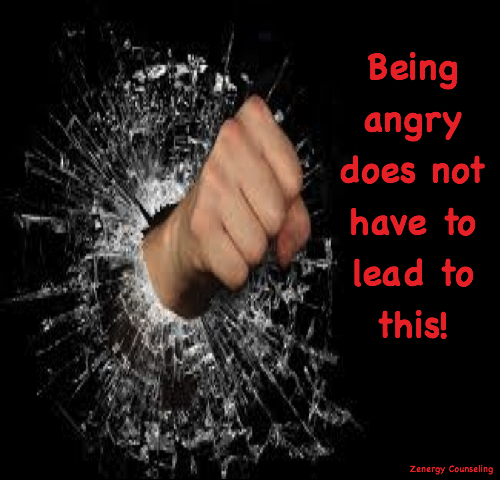How do you define anger? When I ask my clients “what is anger”, most talk about the violent aspect they have witnessed. According to the American Psychological Association, “Anger is an emotion characterized by antagonism toward someone or something you feel has deliberately done you wrong.” So basically, it’s resentment or hostility you have toward someone or something that you feel is to blame for something negative you experienced.
It is generally a secondary emotion- an emotion we use to shield ourselves from a more intense emotion. Imagine watching a show about animals in the wild and seeing one puff itself up to appear stronger than others. It is a way for us to hide our vulnerability but it is not something that forces us to (re)act violently. Many channel this emotion as the push needed to succeed in their goals and in life.
Why talk about this? Why talk about what anger “makes us” do? Because being angry is no reason to act irrationally. Here are some steps you can take to manage anger a bit more productively:
Short term
- Breathe.
It sounds simple but, at that moment, it requires a lot of strength to slow yourself down. Give yourself a chance to control your anger rather than letting it control you.
- Walk away
Another step that takes a lot of strength is to allow yourself the chance to cool down before addressing the issue. Just make sure you communicate that you need some time to cool off before having this discussion. You don’t want to give the impression that you are abandoning someone.
- Identify reason
In order to have a productive conversation, it is important to know what about the situation upset you. While you are away, take a moment to reflect and recognize what your trigger was so you can be mindful of it in the future.
Long term
- Journal
This is so vital to learning more about yourself and your behavior patterns. I don’t mean “dear diary” journaling but if that helps you, go for it! Journaling could be as brief as making a note of a shift in your feelings, possibly based on external factors. Make a note on the phone or write it down- but keep a record and it will help with finding your triggers.
- Behavior modifications
If you do what you have always done- you will get what you have always gotten. To have a change in your life, you have to implement change. If your first response has always been to yell, let’s try something different. Let’s see what result it gets you.
- Therapy
Therapists are trained to notice shifts that sometimes individuals overlook. Something you dismissed may play a bigger role in your life and behavior than you may recognize. They can help you identify if this is a behavior issue or part of mental illness and create a treatment plan to help you manage the shifts in a healthy manner.
AngI recognize that anger is one of the emotions that requires more strength to control than any other emotions. BUT it is not impossible to learn healthy ways of managing the behavior while honoring our hidden feelings. Reach out for assistance. What you learn about yourself may surprise you.

